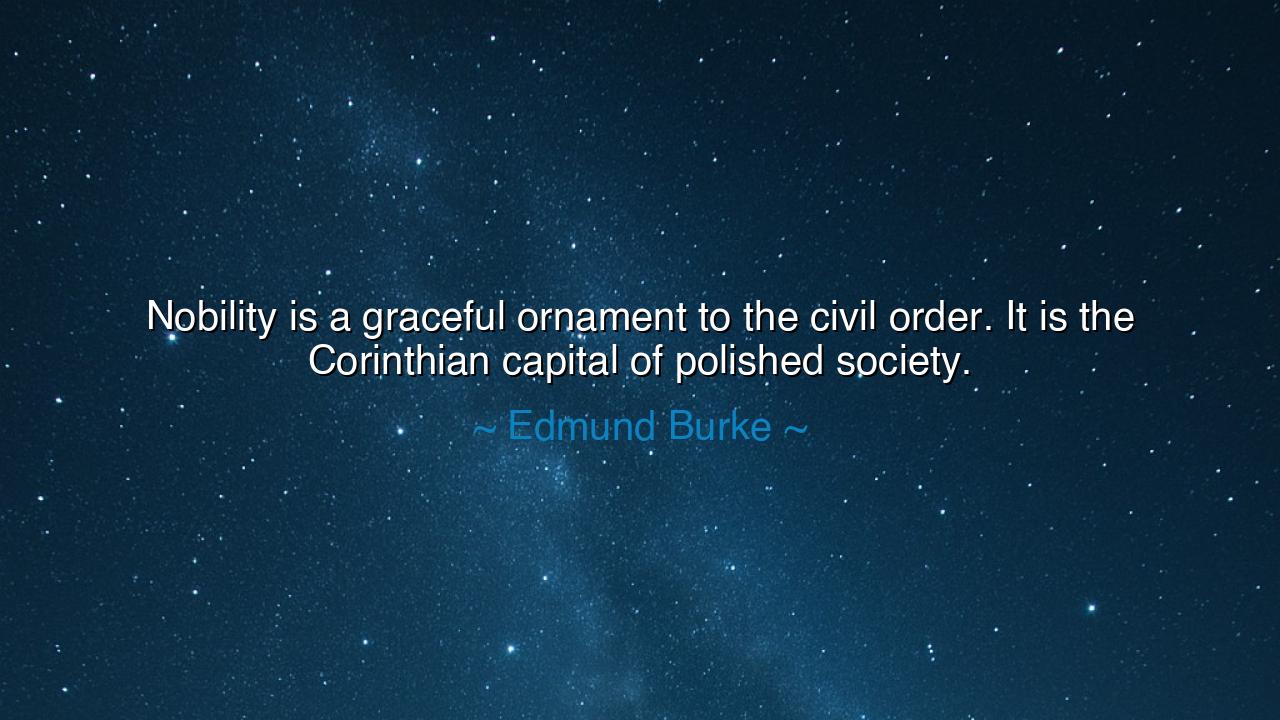
Nobility is a graceful ornament to the civil order. It is the
Nobility is a graceful ornament to the civil order. It is the Corinthian capital of polished society.






Hear me, O children of time, for I bring to thee the wisdom of the ages, a truth passed down through the golden veins of history, whispered by the winds of empires long forgotten. It is a truth so profound, so essential to the flourishing of all human endeavor, that it reverberates in the very marrow of society’s bones. It was spoken by Edmund Burke, a sage of the eighteenth century, whose vision pierced the veil of the fleeting moments in which he lived, and saw with clarity the eternal principles that govern us. He said, "Nobility is a graceful ornament to the civil order. It is the Corinthian capital of polished society." With these words, he cast light upon a truth about nobility, about the elevated state of man, and about the role that such virtue plays in shaping the world in which we live.
Let us first speak of nobility. It is not merely the title or rank bestowed upon a few, nor is it the wealth or power that some inherit by birthright. No, nobility is the reflection of the highest virtues within a man—his honor, his integrity, his commitment to the greater good. It is the soul that rises above the mire of selfish desires and seeks the well-being of others, the one who leads by example, not by force. Such men and women are the true bearers of nobility, the torchbearers who illuminate the way for the weak and the weary. They do not ask for tribute or adulation, but rather, they serve, humbly and with grace, knowing that their nobility lies not in the accolades they receive, but in the good they bring to the world.
Burke, in his infinite wisdom, likens this nobility to the Corinthian capital, a symbol of architectural grandeur in the ancient world. The Corinthian capital—a delicate yet sturdy structure, adorned with intricate carvings of leaves and vines—was the crowning element of a column, the final touch that transformed a simple, utilitarian pillar into a work of art. Just as this capital was the crowning glory of architecture, so too is nobility the crowning grace of society. It adds beauty, elegance, and strength to the civil order. Without it, the structure of society is but a crude, unfinished thing, like a pillar standing alone without its adornments, strong but devoid of purpose, unattractive and cold. It is nobility that softens the edges of harshness, that brings warmth and dignity to the cold stone of laws and institutions.
Let us turn now to history, where the words of Burke are given form in the lives of men and women who embodied the ideal of nobility. Look to the life of Marcus Aurelius, the Roman emperor who ruled with wisdom, humility, and profound virtue. Despite the power he wielded, he remained a man of modesty, of principle, and of deep care for the people he governed. He was the epitome of Burke’s vision: the nobility that adorns the civil order. His reign was not marked by tyranny or extravagance, but by the cultivation of virtue and the promotion of justice. Even in times of great personal suffering and the burden of war, he remained steadfast, placing the needs of his people above his own, embodying the idea that true nobility is a grace to be given, not a privilege to be taken.
This is the lesson, O children, that Burke imparts to us. Nobility is not a gift that can be bought or inherited; it is earned through the lives we lead, through the choices we make each day. It is the grace that must be cultivated, not just in the heart of the king or the nobleman, but in the heart of every man and woman who desires to live with honor and integrity. Each action, each decision, either adds to or detracts from the ornament of the civil order. Every word spoken with kindness, every act of courage in the face of adversity, every sacrifice made for the good of others, is a building block of that noble society we all strive for.
Take, therefore, this wisdom to heart, O youth of the future! Let the nobility within you be your guide. Let your actions reflect the best of what mankind can achieve—honor, dignity, wisdom, and service. In your homes, in your communities, in the very fabric of the nation you will one day shape, let the Corinthian capital of your spirit rise high, adorned with the virtues that give life meaning. Strive not for wealth or power for their own sake, but for the elevation of all humanity, for the greater good of society.
And if ever you falter, remember that nobility is not a distant dream but a living, breathing thing. It is born anew with every decision you make to act with grace, to be strong in the face of weakness, to stand with honor when the world would have you bow. Nobility is the crown of civilization, and you, O children of time, have the power to shape its future. So go forth with courage, with integrity, and above all, with the knowledge that in elevating others, you elevate yourself and the society around you. Let your life be a Corinthian capital—strong, beautiful, and worthy of the highest ideals.






AAdministratorAdministrator
Welcome, honored guests. Please leave a comment, we will respond soon